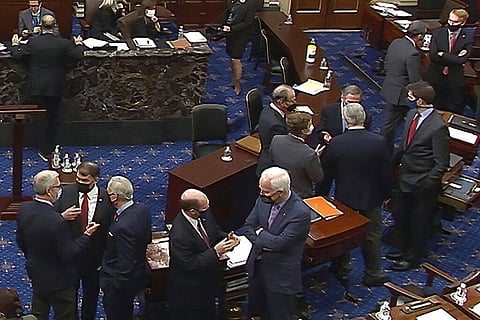

WASHINGTON: House Democrats began wrapping up their impeachment case against Donald Trump on Saturday after a chaotic morning in which they gave up a last-minute plan for witness testimony that could have significantly prolonged the trial and delayed a vote on whether the former president incited the deadly Capitol insurrection.
An unexpected vote in favour of hearing witnesses threw the trial into confusion just as it was on the verge of concluding.
But both sides ultimately reached a deal to instead enter into the record a statement from a Republican House lawmaker about a heated phone call on the day of the riot between Trump and House Minority Leader Kevin McCarthy that Democrats say established Trump's indifference to the violence.
Republicans are anxious to get the trial over with and discussion of Trump and the Capitol invasion behind them.
Democrats, too, have a motive to move on since the Senate cannot move ahead on President Joe Biden's agenda including COVID-19 relief while the impeachment trail is in session.
While most Democrat were expected to vote to convict the former president, acquittal appeared likely with a two-thirds majority required for conviction and the chamber split 50-50 between the parties.
Republican leader Mitch McConnell said he would vote to acquit Trump, according to a person familiar with his thinking.
Closely watched, the GOP leader's view could influence others in his party.
At issue at first on Saturday was whether to subpoena Rep. Jaime Herrera Beutler of Washington state, one of 10 Republicans to vote for Trump's impeachment in the House.
She said in a statement late Friday that Trump rebuffed a plea from McCarthy to call off the rioters.
Democrats consider it key corroborating evidence that confirms the president's "willful dereliction of duty and desertion of duty as commander in chief." The situation was resolved when Herrera Beutler's statement on the call was read aloud into the record for senators to consider as evidence.
As part of the deal, Democrats dropped their planned deposition and Republicans abandoned their threat to subpoena hundreds of their witnesses.
The case then proceeded to closing arguments. Lead House impeachment manager Rep.Jamie Raskin of Maryland had said that witnesses were necessary to determine Trump's role in inciting the riot.
There were 55 senators who voted for his motion to consider witnesses, including Susan Collins of Maine, Lisa Murkowski of Alaska, Ben Sasse of Nebraska and Mitt Romney of Utah.
Once they did, Lindsey Graham of South Carolina changed his vote to join them on the 55-45 vote.
Trump lawyers opposed calling witnesses, with attorney Michael van der Veen saying it would open the door to him calling as many as 100.
He said the depositions could be done in his law office in Philadelphia, prompting laughter from senators.
"If you vote for witnesses," Van der Veen said, crossing his arms and then then raising them in the air for emphasis, "do not handcuff me by limiting the number of witnesses that I can have."
Senators meeting as the court of impeachment are restrained in taking up other business without consent of the Republican minority, which is unlikely.
Rules require senators to be present for the proceedings and this past week almost no other major items have been considered as the trial was underway.
The outcome of the raw and emotional proceedings is expected to reflect a country divided over the former president and the future of his brand of politics.
The verdict could influence not only Trump's political future but that of the senators sworn to deliver impartial justice as jurors.
"What's important about this trial is that it's really aimed to some extent at Donald Trump, but it's more aimed at some president we don't even know 20 years from now," said Sen.
Angus King, the independent from Maine.
The nearly weeklong trial has delivered a grim and graphic narrative of the riot and its consequences in ways that senators, most of whom fled for their own safety that day, acknowledge they are still coming to grips with.
House prosecutors have argued that Trump's rallying cry to go to the Capitol and "fight like hell" for his presidency just as Congress was convening January 6 to certify Biden's election victory was part of an orchestrated pattern of violent rhetoric and false claims that unleashed the mob.
Five people died, including a rioter who was shot and a police officer.
Trump's lawyers countered in a short three hours Friday that Trump's words were not intended to incite the violence and that impeachment is nothing but a "witch hunt" designed to prevent him from serving in office again.
Only by watching the graphic videos -- rioters calling out menacingly for House Speaker Nancy Pelosi and Vice President Mike Pence, who was presiding over the vote tally -- did senators say they began to understand just how perilously close the country came to chaos.
Hundreds of rioters stormed into the building, taking over the Senate.
Some engaged in hand-to-hand, bloody combat with police.